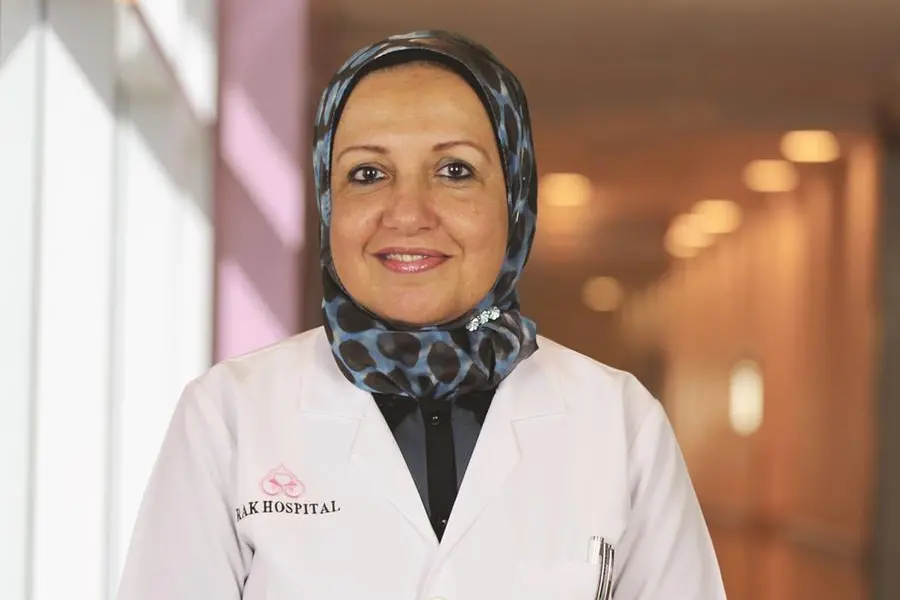PHOTO
Ras Al Khaimah, UAE – Continuing its mission to educate the community on effective diabetes management, RAK Hospital held an insightful webinar titled “Diabetes: A Metabolic Syndrome” as part of the ongoing RAK Diabetes Challenge. This marked the third year of the successful initiative, which aims to empower participants with knowledge and tools to combat diabetes. The session was led by Dr. Hala Youssef Hamdy AbouelSeoud, Specialist Endocrinology & Head of Department at RAK Hospital.
Dr. Hala highlighted the global challenge of diabetes, which affects nearly half a billion people worldwide. She discussed the lifestyle factors contributing to the rise of this condition, including genetics, poor diet, lack of physical activity, and a sedentary lifestyle. Dr. Hala emphasized that these factors, combined with certain medical conditions, constitute what is medically known as Metabolic Syndrome, or Syndrome X.
Metabolic syndrome is a cluster of conditions that occur together, increasing your risk of heart disease, stroke, and type 2 diabetes. These conditions include:
- Increased Blood Pressure: A reading of 130/85 mmHg or higher.
- High Blood Sugar: Fasting blood glucose levels over 100 mg/dL.
- Excess Body Fat Around the Waist: A waist circumference of over 40 inches in men or 35 inches in women.
- Abnormal Cholesterol or Triglyceride Levels: High triglycerides (over 150 mg/dL) and low levels of HDL cholesterol (less than 40 mg/dL in men and 50 mg/dL in women).
Having at least three of these conditions qualifies as metabolic syndrome. It is closely linked to insulin resistance, where the body's cells do not respond properly to insulin, leading to higher blood sugar levels. This syndrome is often associated with obesity, particularly abdominal obesity, and a sedentary lifestyle.
Metabolic syndrome significantly raises the risk of developing serious health issues such as cardiovascular disease and type 2 diabetes. Managing it usually involves lifestyle changes such as improving diet, increasing physical activity, and losing weight, along with medical treatment for any underlying conditions.
Dr. Hala noted that Metabolic Syndrome impairs the body’s ability to utilize insulin effectively, leading to elevated blood glucose levels and, ultimately, diabetes. She warned that excessive glucose in the bloodstream could result in severe complications, including high blood pressure, cardiac ailments, neuropathy, and renal disease.
“To effectively manage and treat diabetes, a holistic approach is essential. This begins with lifestyle changes, including a diet low in carbohydrates such as starches, white bread, and rice and high in fiber from green leafy and other vegetables. I recommend incorporating at least 30 minutes of moderate exercise daily, whether it's walking, swimming, or even household chores. It's also crucial to maintain a healthy weight, ideally with a BMI below 25; research shows that losing just 7% of excess weight can reduce the risk of developing type 2 diabetes by an impressive 58%.
For those with concerning blood sugar readings such as fasting glucose levels above 120 mg/dL, random blood sugar exceeding 200 mg/dL, or a glycated hemoglobin (HbA1c) level greater than 6.5% consulting a healthcare provider for further management is vital”, said Dr. Hala Al Hourani.
For individuals with blood sugar readings beyond the normal range, Dr. Hala discussed the need for therapeutic and pharmacological support, including medications like Metformin, Sulfonylureas, and Glucosidase inhibitors. She emphasized the importance of continuous and diligent management of diabetes to prevent complications and potentially reverse the condition.
During the Q&A session, Dr. Hala addressed various participant queries, emphasizing the need for regular HbA1c tests, annual eye and kidney exams, blood pressure control, frequent foot exams, and weekly self-monitoring of blood sugar.
As RAK Hospital continues to lead the fight against diabetes through initiatives like the RAK Diabetes Challenge, the hospital remains committed to providing comprehensive education and support to the community, helping individuals take control of their health and improve their quality of life.
For more information on RAK Diabetes Challenge 2024, visit www.rakdiabeteschallenge.com



















